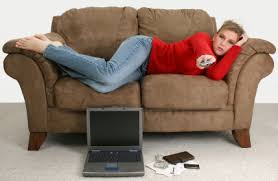Today marks exactly four months since I decided to go without TV for a six-month period, a kind of Thoreau-like experiment, saving the distance, of course.
I haven't cheated, except for Game 7 back in June, when the Miami Heat won the NBA championship. Game 7 was a the deciding, nerve-wracking, nail-biting game, and no, it doesn't count as cheating.
Aside from that, nothing, nada. I literally haven't had TV.
Here's what happened.
Shortly after the Heat game, I got my bill from AT&T U-verse, and almost fell to the floor when I saw that the monthly amount for the TV had almost doubled. Turned out that the promotions I had gotten when I first signed up were now expired. And hey said no, there wasn't anything they could do for me now. Hello? Didn't they know that if there was ever a customer they needed to woo, it was me? Hadn't they read my blog? Apparently not, so I just cancelled. Radical.
I promised my daughter I would look for a cheaper provider, and to just bear with the silence for a few days. Or maybe we would talk more, and not even notice the silence. In any event, a few days turned into a few weeks, in part due to a frustrated attempt with Comcast, in part due to other things calling for my attention, like gardening and reading. And we did talk more over dinner. Heck, I actually
cooked dinner. The rest of the time, as the evening wound down, we had only the muted noises of a quiet household: the cat prancing around, the AC humming, a question about homework, pages turning on a book, texts buzzing back and forth on my daughter's phone.

Then, just as my daughter was beginningn to contemplate running away from this TV-less home, a new offer from AT&T arrived in the mail, at the same price as before, maybe even a couple dollars cheaper! Today, four months into my six-month hiatus, we got hooked up again. A test from the universe, of course.
When the technician turned on the set to check if all was working properly, the list of shows brightly displayed on the screen made me feel like a kid opening a chest of forgotten toys. On top of that, radio ads for new season premieres have been playing on the radio:
How I Met Your Mother,
Two Broke Girls,
Big Bang Theory, and tons of new shows. And pretty soon, people will be talking about the more serious shows, like
Scandal, and already I'm out of the conversation when it turns to
Breaking Bad, which I have no idea what it's about.
But no, I'm not falling off the wagon.

An interesting thing in the first TV-less trimester is that it happened to include a short visit to Los Angeles, the cradle of TV. We toured one of the major studios, of course, Warner Brothers, chosen because it contains remains of the set for
Gilmore Girls, one of my favorite TV shows ever, ever, ever. We saw the front of Luke's Diner, and I could imagine Lorelai prancing in and ordering coffee. (
Gilmore fans will know what I'm talking about.)
We saw New York and Chicago street alleys that looked so real, you expected a garbage truck to come by any minute. We saw the office for
The Mentalist, as drab and cluttered as so many offices I've been in. We stepped in the coffee house for
Friends, and learned that if you put a big couch right in front of the camera, the stuff behind the couch looks small, which in turn makes the overall space appear much larger on the screen. And we saw the perennially broken elevator and stairs that lead to Sheldon's and Penny's apartments in
Big Bang Theory, another favorite of mine, which is still filming, but whose season premiere I won't get to see.
Learning the visual and engineering tricks of TV production was a lot of fun, as entertaining as the make-believe stories that are played on it. It makes me question, what exactly is the evil of TV that I seek to escape?
There's no evil in TV. It's make-believe as engaging as storytelling has been since the days of Beowulf. (Not that I know exactly when that was, except for a notion that Beowulf is one of the first pieces of literature in the English language, if not the first. English lit gurus, feel free to set me straight.) What is TV if not story telling? One story, after another, after another.
While in L.A., I spent time with flesh and bone friends, friends whose story lines I know since childhood, and whose lives have continued to unfold with expected and unexpected twists and turns that don't lack for drama, as much drama as any soap opera, as much humor as any situation comedy, as much uncertainty as any suspense series.
We write the plot and the lines as we go. You look good. You are so smart. So brave. So kind. A pain, sometimes. Me, a pain too? Ha!
The laughter isn't canned. The jokes aren't scripted. The fears that are part of life, as real as it gets. And so is the affection. Our outcomes may or may not be perfect, we don't know. But the hoping for and rooting for and cheering on and arguing against and laughing at is live, the kind of live that goes through someone's skin.
There's no evil in TV, it harbors as much creativity and healthy entertainment as it does mind-numbing noise and distorted reality. But away from it and with real life friends I have a role in the story, a story that really makes me vibrate with laughter and wonder.

